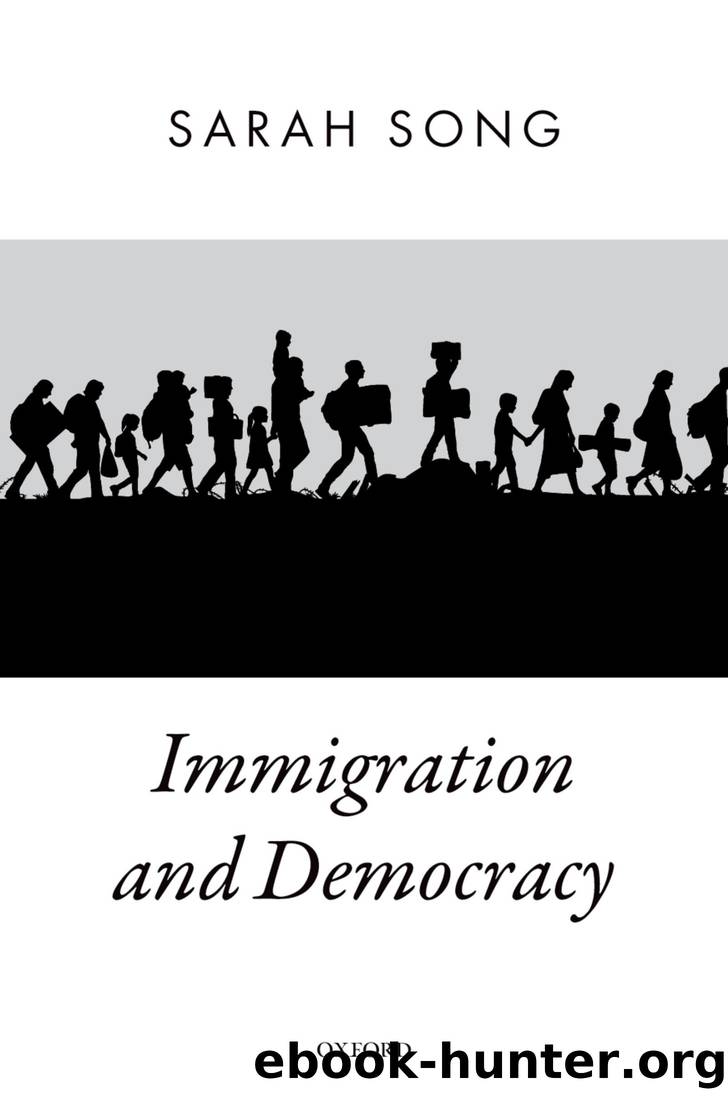Immigration and Democracy (Oxford Political Theory) by Sarah Song

Author:Sarah Song [Song, Sarah]
Language: eng
Format: epub
Publisher: Oxford University Press
Published: 2018-10-31T04:00:00+00:00
Another example is Trumpâs call for giving preferential treatment to Christian refugees from majority-Muslim countries because of a cultural affinity with a vision of America as a Christian nation. But the preference for Christians seems to be a thinly veiled attempt to ban Muslims, something Trump promised to do during his presidential campaign, which several courts held was behind his executive order banning travel from predominantly Muslim countries.41 Even where a preference for one group is not motivated by animus against another group, it is hard to justify selecting on the basis of religious or cultural affinity in the case of refugees given the urgency of their needs and unless there are other countries who will take in the disfavored groups. The United States could only prioritize Christian refugees if there are indeed other countries that are willing to take in Muslim refugees at comparably higher numbers to make up for the United States taking in lower numbers of Muslim refugees, but this assumption seems unlikely to be met.
Another principle that should be factored into determining a fair distribution of the responsibility to take in refugees is causal responsibility for turning people into refugeesâthat is, the idea that an agent who has caused a particular outcome bears a duty to remedy that outcome. We might adopt a principle of proportionality in assigning remedial responsibility: the greater the agentâs role in causing the harm, the greater the remedial responsibility. Causal responsibility for refugee crises is often the result of military involvement, such as the NATO bombings impacting Kosovar Albanians, US encouragement of Kurdish rebellions during the Gulf War, and US and Australian actions in Indo-China during the 1960s and 1970s.42 Another example is US involvement in the civil wars in Central America. In 2014, President Obama declared the âsurgeâ of Central American children crossing the US border to be a humanitarian crisis; but the causes of the displacement had been developing over a much longer period, as intense drug wars, gang violence, and failing infrastructure turned Honduras, El Salvador, and Guatemala, known as the Northern Triangle, into the âmurder capitalsâ of the world. The current violence in these three countries stems in part from the civil wars in the region in the 1970s and 1980s, which were funded by the United States and resulted in the prevalence of arms in the region.43 The US government bears some causal responsibility for creating the conditions that have forced unaccompanied minors to flee, and it has the integrative capabilities to take them in, but the Obama administration chose to treat the âsurgeâ as an enforcement problem rather than a refugee crisis, placing these children on a ârocket docketâ limiting meaningful due process and access to competent counsel. Meanwhile, immigration judges moved in the opposite direction as the Obama administration, granting asylum to thousands of women and children who had fled gang violence in Honduras, El Salvador, and Guatemala.44
To sum up, a fair distribution of the responsibility to take in refugees is one based on integrative capabilities and causal responsibility, not solely or primarily on geographic proximity.
Download
This site does not store any files on its server. We only index and link to content provided by other sites. Please contact the content providers to delete copyright contents if any and email us, we'll remove relevant links or contents immediately.
Cecilia; Or, Memoirs of an Heiress — Volume 1 by Fanny Burney(32558)
The Great Music City by Andrea Baker(32018)
Cecilia; Or, Memoirs of an Heiress — Volume 2 by Fanny Burney(31956)
Cecilia; Or, Memoirs of an Heiress — Volume 3 by Fanny Burney(31941)
We're Going to Need More Wine by Gabrielle Union(19046)
All the Missing Girls by Megan Miranda(16023)
Pimp by Iceberg Slim(14506)
For the Love of Europe by Rick Steves(14121)
Bombshells: Glamour Girls of a Lifetime by Sullivan Steve(14073)
Talking to Strangers by Malcolm Gladwell(13370)
Norse Mythology by Gaiman Neil(13363)
Fifty Shades Freed by E L James(13239)
Mindhunter: Inside the FBI's Elite Serial Crime Unit by John E. Douglas & Mark Olshaker(9339)
Crazy Rich Asians by Kevin Kwan(9290)
The Lost Art of Listening by Michael P. Nichols(7506)
Enlightenment Now: The Case for Reason, Science, Humanism, and Progress by Steven Pinker(7311)
The Four Agreements by Don Miguel Ruiz(6763)
Bad Blood by John Carreyrou(6621)
Weapons of Math Destruction by Cathy O'Neil(6279)
